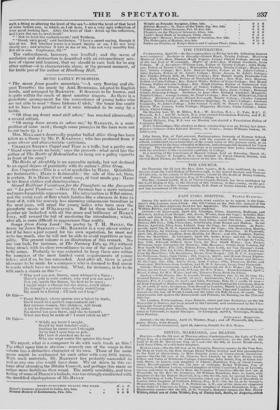MUSIC LATELY PUBLISHED.
"The moon from yonder mountain. "-A very flowing and ele- gant Terzetto ; the music by And. ROMBERG, adapted to English words, and arranged by BARNETT. It deserves to be known, and is quite within the reach of most amateur singers. As there is a
pianoforte arrangement for the convenience of young ladies who are not able to read " those hideous C clefs," the tenor line ought not to have been printed as if it were intended to be sung by a treble.
"Oh thou my heart must still adore," has reached (deservedly) a second edition.
"Oh many have sworn to adore me," by BARNETT, is a com- position of some merit; though some passages in the bass were not to our taste (p. 1.) Mrs. MILLARD.S deservedly popular ballad Alice Gray has been taken as a theme by Mr. P. KNAPTON ; who has produced from it some clever and characteristic variations.
CHARLES Swill's Cupid and Time is a trifle, but a pretty one. "Good wine needs no bush," says the proverb : what need has the author of The Battle of Hohenlinden to hang out a paltry vignette in front of his song?
The Birks of Aberfeldy is an agreeable melody, but not destined to an equal degree of popularity with its author's Alice Gray. Les Coquettes.-This is a set of quadrilles by JlEnz. Quadrilles are fashionable ; HERZ is fashionable : the sale of this set, then, is certain. It is HERZ, if not made easy, at least made gay: HERZ in his finest clothes and dancing-shoes.
Grand Brilliant Variations for the Pianoforte on the favourite air "Le petit Tambour."-Here the German has a more national and more formidable appearance. His introduction in B flat minor, and the awful rank of flats which bristles like a chevaux de frize in front of it, with his scarcely less alarming enharmonic transition in the next page, will appal the young ladies who turn over the pianoforte music at D'ArztAixes. But let them take heart : popular air bedecked with all the grace and brilliancy of IlEnz's fancy, will reward the toil of mastering the introduction; which, after all, is more difficult in appearance than reality.
Songs from Fairy Land: the poetry by T. H. BANIX, the music by JOHN BARNETT.-Mr. BAR:VETT is a very clever writer ; but if he have a just regard for his own reputation, he must not write too much, else he will not be able to avoid repetition.or insi- pidity. The present volume is an illustration of this remark. No one can look, for instance, at The Nursery Tale, (p. 39,) without being struck with its close resemblance to one of the author's but- terfly songs. Probably he was exhorted to keep these airs within the compass of the most limited vocal acquirements of young ladies ; and if so, he has succeeded. And after all, there is great allowance to be made for a composer who is doomed to find music to words which have no meaning. What, for instance, is he to do with such a stanza as this ?-
"Why wed you not, Baron, once whisper'd a Fairy ;
There's gold in your coffers, why wed you not now ? Not yet, quoth the Baron, 'tis best to be vary; I might make a change for the worse, you'll allow: My temper's a jealous one-beauty would keep My mind in a frenzy : I'll look ere I leap."
Or this-
" Dame Bridget, whose spouse was a baker by trade,
Ow'd much to a sprite's supernatural aid : But curious women, like children, will break
A toy to discover the trick of its make.
No mortal has seen them, said she to herself;
What can they be made of ? I must catch an elf."
Or this- .
" Wildly my lover I sought, Scar'd by that desolate wail ; Smiling he came-yet I thought
Neer had I seen him so pale.
Oh ! how it shocked me to see
Why she wept under the spectre like tree."
We repeat, what is a composer to do with such trash as this ? The effect upon him is obvious : scarcely one of the songs in this volume has a distinctive character of its own. Those of the same metre might be exchanged for each other with very little injury. With such materials, Mr. BARNETT has probably succeeded as well as any one else would have done. We sat down to this vo- lume after attending the Dibdin Concert, and perhaps this made us rather more fastidious than usual. The manly sensibility, and true feeling of some of DIBDIN.S ballads, was too strongly contrasted with the dandified slipsloppiness of Mr.BAYLY .
BOOKS PUBLISHED MIRINO TDB WEER.
Heber's Sermons preached in India, Svo. bds. Natural fits wry of Enthusiasm, Svo. bds.
s. d.
0 9 6 0 d 0 Wright on Friendly Societies,12mo. bds. . . 0 5 0
African Morsels; or, Tales of the Table, fcp. Svo. bds.
0 8 0
Edmonson's Short Sermons, Vol. 11. Svo. bds .
0 9 0 Chapters on the Physical Sciences, 12mo. bds. . . 0 6 0 Leigh's Road Book of Scotland, 18tno. sheep . 0 8 0
Marriott's (Hervey) Fourth Course of Sermons, Svc.. bds. .
0 le 6
The Philosophy of History, Svo.bds. . . .
0 15 0
Parkes on Practice of King's Balch and Common Pleas, 12mo. bds.
0 8 0


















 Previous page
Previous page